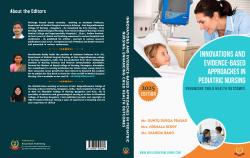FOUNDATIONS OF PEDIATRIC NURSING: DEVELOPMENTAL AND FAMILY – CENTERED CARE
Abstract
Family-centered care (FCC) in paediatric nursing focuses on the important role families play in their child's health and well-being. This approach treats families as active partners in care, making sure their values, beliefs, and strengths are included in treatment plans. Involving families in their child's care leads to better health outcomes, so it's essential for paediatric nurses to support and involve families throughout the care process. Focus on the child through the family centered care is the magic that creates major change in health and well-being. A key part of FCC is the nurse's presence, which helps build strong, trusting relationships through good communication. These connections improve the physical, emotional, and social well-being of both the child and their family by creating a supportive and understanding environment. Adding more care through the process of FCC is the key for early discharge. Although research shows a link between FCC and positive nursing relationships, more studies are needed to provide stronger evidence and improve family nursing care. Healthcare teams are also working together more than ever, recognizing that collaboration among professionals leads to better care for children. This teamwork has led to better health outcomes and strengthened the role of paediatric nurses as advocates for children's health. Skilled nurse will influence the family to be the part of care and planned treatment. FCC not only improves medical results but also builds a stronger partnership between healthcare providers and families. Family involvement is seen as essential for meeting a child’s needs and supporting the family as a whole. Providing family-centered care means recognizing that families are a constant part of a child’s life, relationships shape children’s well-being, and involving families in care leads to better outcomes for the child. FCC is the vital psychological support for the child.









